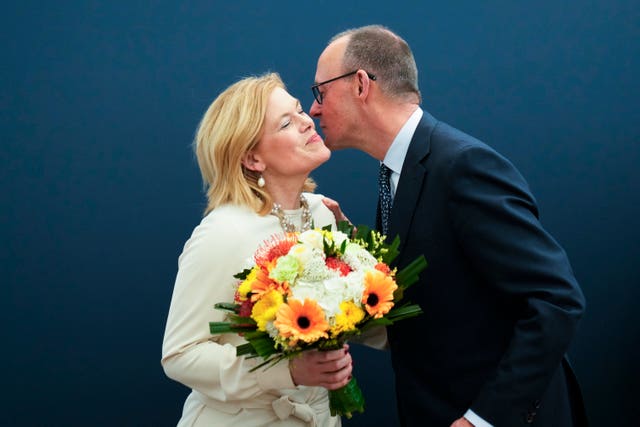Friedrich Merz on course to lead Germany after election and vows to unite Europe
He has repeatedly pledged not to work with the far-right anti-immigrant Alternative for Germany party.

Friedrich Merz, who is set to become the new German chancellor, has vowed to prioritise European unity and the continent’s security as it grapples with the new Trump administration and Russia’s war on Ukraine.
Mr Merz’s task will be complicated by the need to form a coalition with the centre-left Social Democrats of outgoing chancellor Olaf Scholz.
He has repeatedly pledged not to work with the far-right anti-immigrant Alternative for Germany party, despite its second-place finish.
The 69-year-old conservative leader heads the centre-right Union bloc, which won Germany’s national election with 28.5% of the votes.

“I am also aware of the scale of the task that now lies ahead of us,” he told supporters after his victory on Sunday night.
“The world out there isn’t waiting for us, and it isn’t waiting for long-drawn-out coalition talks and negotiations.”
The top job has been late in coming for Mr Merz, a lawyer by profession, who saw his ascent derailed by former chancellor Angela Merkel in the early 2000s and even turned his back on active politics for several years.
Despite his political experience, he is heading to the chancellery without previously having served in government.
Ms Merkel has described Mr Merz as a brilliant speaker and complimented his desire for leadership, though she acknowledged this was a problem in their relationship.
“We are almost the same age … We grew up completely differently, which was more of an opportunity than an obstacle,” she wrote in her memoir Freedom.
“But there was one problem, right from the start: We both wanted to be the boss,” she said.
Ms Merkel moved to consolidate her grip on Germany’s centre-right after the Union narrowly lost a national election in 2002.
She pushed Mr Merz aside as leader of its parliamentary group, taking the job herself in addition to the leadership of the Christian Democratic Union party she already held.
She went on to lead Germany from 2005 to 2021.
Mr Merz turned his back on active politics for several years after leaving the parliament in 2009.
He practised law and headed the supervisory board of investment manager BlackRock’s German branch.
During that break, he often travelled for business to the United States and China, though he never lived outside Germany.
“Friedrich Merz is perhaps the most international chancellor Germany has had since the war — if he becomes chancellor,” said Volker Resing, who wrote the recently published biography Friedrich Merz: His Path To Power.
Mr Merz “relies on personal initiative, on the freedom of the individual, on creativity and motivation. And only secondarily on the state,” Mr Resing said.
Mr Merz launched his political comeback after Ms Merkel stepped down as CDU leader in 2018 and announced that she would not seek a fifth term of chancellor.
However, he was narrowly defeated by centrist candidates more in Ms Merkel’s mold in party leadership votes in 2018 and early 2021.
Mr Merz persisted and was elected party leader in the third attempt, after the centre-right’s defeat by Mr Scholz in Germany’s 2021 election.
Mr Merz cemented his power by also becoming the leader of the Union’s parliamentary group.
According to Mr Resing, Mr Merz’s “way of doing politics” is not to avoid confrontation at all costs.

Instead, he maintains a perspective that “a certain amount of provocation can set off a real debate and perhaps a real development in motion.”
During the election campaign, Mr Merz has vowed to make Germany’s ailing economy strong again and curb irregular migration.
With President Donald Trump back in the White House and tensions rising over how to resolve the war in Ukraine, Mr Merz, who has long supported a strong transatlantic relationship, said after his victory that his top priority is to unify Europe in the face of challenges coming from the United States and Russia.
“I have no illusions at all about what is happening from America,” he told supporters.
“We are under such massive pressure … my absolute priority now is really to create unity in Europe.”
Mr Merz put toughening Germany’s immigration laws at the forefront of the election campaign after a migrant killed two people in a knife attack in the Bavarian city of Aschaffenburg last month.
He brought a nonbinding motion before the parliament, calling for many more migrants to be turned back at Germany’s borders. The motion was narrowly approved thanks to votes from the far-right Alternative for Germany, or AfD, party.
That prompted his opponents to accuse Mr Merz of breaking a taboo in allegedly working with the AfD, and a public rebuke from Ms Merkel.
Critics pointed to the episode as an illustration of what they say is Mr Merz’s tendency to impulsiveness.
Since then, hundreds of thousands have taken to the streets to protest against both Mr Merz’s motion and also the rise of the far right.
Mr Merz has insisted he did nothing wrong and never worked with AfD, and also repeatedly vowed to “never” work with the party if he becomes chancellor.





